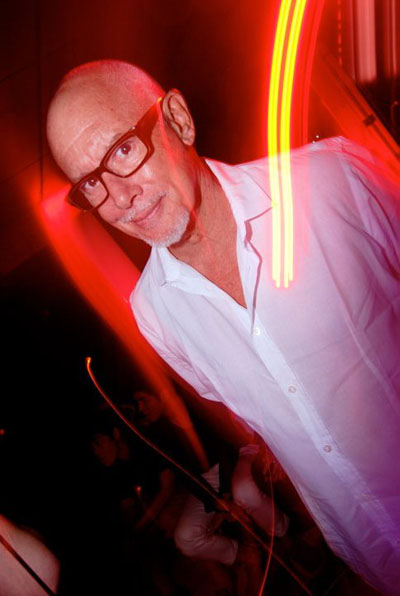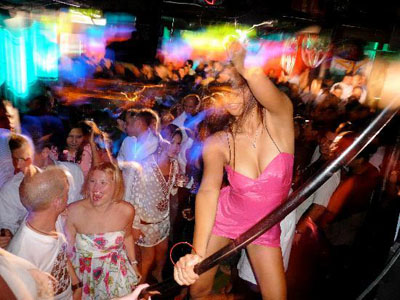The Accidental Bartender
David Jacobson’s hot Bangkok nightspot offers the glitz without too much of the sin of Sin City
Tibor Krausz
The Jerusalem Report, June 12, 2006
Bangkok
Danny Howells, a top-flight DJ from the UK, is treating a full house in Q Bar to compositions in his style labeled humbly as “deepsexyfuturistictechfunkhouse.” The pounding beats of his Destiny’s Child and Robbie Williams remixes invade the posh nightclub’s designer penumbra of dimmed aquarium light, inhabited by the some 500 people who have made it past the dour Thai bouncer with the scarred brow of an erstwhile prize fighter.

By 11.30pm, the smaller bands of partygoers who arrived together have melted away into transient clusters of revelers making new friends.
Opposite the bar boasting serried ranks of a gazillion connoisseur spirits, a forlorn-looking European man in his early 30’s nurses a White Russian, his gaze darting timidly around the faces of nearby clubbers. Presently he finds himself beside a woman with curly blond hair about the same age. She is an English teacher at an international school and also came here alone tonight. The two of them seem to hit it off well and when the bar closes at 2am, they exchange cellphone numbers.
That’s just the way David Jacobson likes it.
Jealously guarding his bar’s premises from becoming yet another venue in Bangkok’s Sin City catering to moneyed foreign men looking to be entertained for the night by young Thai women, or men, desiring to supplement their day-job incomes, Jacobson cultivates an environment where single professionals can mingle and meet after work in the hopes of finding a mate for a meaningful long-term relationship, and where married couples can equally feel at ease.
This clean-good-fun approach may appear like a Sisyphean undertaking in Thailand’s capital, a world-renowned sex tourism destination, and Jacobson readily concedes as much. “It’s never really possible here to keep all prostitutes out of a bar that includes foreigners in its clientele.” He tries his best, though. “Unlike most bars,” he explains, “we don’t give [freelance sex workers] free entrance and free drinks and we certainly don't have lockers for them.”
Jacobson has also designated his bar’s penthouse-style balcony as an exclusive area requiring a special coupon handed out free of charge to both one-off clubbers and regulars who indicate they are here to form lasting friendships and relationships, not to find one-night stands. Gays, lesbians and transvestites are welcome in Q Bar, and a British online gay publication raves about the club’s “sexy low-slung leather sofas, dramatic lighting and almost edible staff.”
“David was the first to capitalize on a legitimate singles venue in Bangkok by refusing to pander to the traditional working girl/ working boy scene,” says Aaron Frankel, a Bangkok-based Jewish nightlife guru from Washington, DC.
Jacobson, a short, wiry 59-year-old Jew from Los Angeles, sports a shaven pate and a graying goatee. His textile moccasins dyed in the jaunty colors of a Disney cartoon advertise a dash of spirited eccentricity behind a conservative blue-black sartorial front. His shoes match a bank of backlit acrylic panels set in a vinyl-padded black wall inside his bar. “I didn’t come over here to be a pimp,” he notes in his raspy baritone.
***
An accidental bartender, Jacobson has become something of a legend among expat partygoers in Southeast Asia. Yet his first dalliance with inn-keeping was anything but auspicious. A bored political science graduate, in 1970 he opened an eatery selling gourmet sandwiches at the University of Southern California. “Students would come in, buy a pot of tea, and play chess for four hours,” he recalls.

In search of a more rewarding occupation, Jacobson bought a used Nikon and metamorphosed into a freelance photographer. Over time he worked his way up to Glamour and Variety magazine level. He says he photographed Tom Cruise while the future “Top Gun” star was still a nameless rookie, shot Tyra Banks when she was only a 14-year-old up-and-comer, and discovered supermodel Beverly Peele.
He tells of becoming chummy with Mel Gibson, and that Dustin Hoffman grew so enamored of him that he extended Jacobson’s three-day contract for six weeks while shooting poster and promotional photos for Hoffman’s 1982 comedy classic “Tootsie.” (The actor’s friendly gesture, Jacobson says, cost director Sidney Pollack a small budgeting fortune, whereupon he booted the photographer off the set.)
In other words, Jacobson was leading a charmed life hobnobbing with superstars. Not quite.
“My career became like [the comedy] ‘Groundhog Day’: I kept reliving the same day again and again,” he says. “Working with stars is like babysitting. You have to constantly compliment them and are always on pins and needles not to offend them.” Ethnocentrism didn’t work, either. Jacobson says a celebrated Jewish diva had him schlepping his equipment load around all day outside her palatial home in the relentless Miami sunshine, and when he asked for a sip of water, she sent for a beat-up plastic cup to be brought from the tool shed. Another Jewish celebrity kept taunting Jacobson throughout a long shoot: “You’re a Jewish boy and the best you can do is be a [expletive] photographer?”
He fled to Vietnam to snap pictures for a UN-sponsored humanitarian program for children. It was 1991 and after almost two decades of international isolation the Communist country was embarking on its perestroika-style economic liberalization known as doi moi. Enterprising Westerners were arriving in droves. “I thought to myself, ‘All these guys would need a drink,’” Jacobson remembers.
The smattering of dreary karaoke bars and curbside beer stalls in Saigon (now Ho Chi Minh City) held little appeal for a more sophisticated foreign clientele. With help from his Vietnamese girlfriend, who had escaped to the United States via Malaysia by boat after the North Vietnamese takeover of Saigon, Jacobson set about revitalizing the city’s once-legendary nightlife. “When I told my friends back home I was going to open a bar in Saigon,” he notes, “they went, ‘You mean in Little Saigon in Orange County?’”
In Saigon, Vietnam, Jacobson rented an elongated recess — some 30 yards long and 4 yards deep — which doubled as a foundering restaurant along the side of the frilly, colonial-era National Theater. He wanted to create a designer bar rivaling any in Manhattan, but in all of austere Vietnam he couldn’t find a single barstool to his taste. So he hired a team of local woodworkers and ironsmiths and handed down his instructions to the last doorknob. He also slew “a million cockroaches.”
On the bar’s single wall he had a large copy of the Caravaggio masterpiece “The Musicians” painted, so patrons would be sitting in silhouette against the mural. As entertainment venues in Vietnam couldn’t operate under foreign names, Jacobson called his establishment Q Bar, the letter “q” having a catchy array of connotations, he says: q for queue, for queer, for Viet Kieu (pronounced Q and designating overseas Vietnamese).
With friends and acquaintances smuggling in a wide variety of quality whiskey, vodka and tequila, he was in business. Q Bar became an instant hit with expatriates and tourists alike. Patrons table-hopped at curbside as local Vietnamese streamed by on motorcycles. Soon, Newsweek listed the venue among the best 50 bars in the world (twice), and The New York Times Magazine featured Jacobson on its cover about American entrepreneurs making their mark in a new Vietnam. Saigon’s Q Bar also made it into the syndicated comic strip Doonesbury.
“One day John F. Kennedy Jr. and Daryl Hannah showed up,” Jacobson recalls. “When they returned home, they were wearing Q Bar T-shirts and baseball caps, with all those paparazzi waiting for them at JFK Airport.” (All together, some 40,000 Q Bar Saigon T-shirts were sold, becoming prized collectibles with fans of the bar.) “Soon after [Robert] de Niro shows up with his son at the door asking, ‘Is David Jacobson here?’ Then Norman Mailer comes looking for me with his wife. I took them sightseeing around Saigon in a cyclo.”
Vietnamese officials also came knocking. They offered to “make life easier” for the American in exchange for a 51-percent stake in his business. “I didn’t blink,” he says, and refused to pay up. In 1998, the authorities in turn refused to renew his visa. No explanation was given, but rumors started circulating he was suspected of being a CIA operative working to subvert the country’s morals. His time as Vietnam’s most famous bartender was up.
***
Jacobson’s decision to replant Q Bar on Thai soil the following year was courting disaster from the get-go — according, that is, to a prominent fortune-teller consulted by a prospective Thai partner. As the American was scouting for sites in Bangkok, the businesswoman insisted Jacobson forget about a failing restaurant he had been eyeing in a “dead-end soi” (street) because the place would incur a “bad karma.” Jacobson persisted, so his Thai partner bowed out. Six years later, thanks to Q Bar, the formerly uncool location has turned into a mise-en-scene for high-end nightlife. (The place recommended as a sure bet by the fortune-teller has meanwhile been languishing unused and abandoned.)
The city’s “hi-so” clubbers (a fickle bunch of ostentatious local spendthrifts shunning places frequented by the “low-so”) fell in love with the new Q Bar, soon to be declared by the Lonely Planet travel guide as “Bangkok’s bar of choice for anyone who’s someone.” A wealthy Thai man even named his Persian cat after the establishment. The club’s retro leather sofas and swivel chairs have also given posterior comfort to the likes of Jackie Chan, Oliver Stone and Mick Jagger.
Jacobson’s venue has spawned a host of imitators and Q Bar has become something of a trademark across Southeast Asia, with several dozen spin-offs hogging the unpatented name of the American’s trend-setting club with impunity. “The other day a guy walked in telling me he’d just opened a Q Bar in Malaysia. It’s a kind of compliment, I guess,” Jacobson muses.
Jacobson remains a stickler for do-it-your-way eminence. His reputation as a boss is that of a hard-nosed martinet who lords it over his Thai staffers, who get regular drilling in the minutiae of Reposado tequila’s relative merits over Chicano. Customers with middling tastes need to shape up, too. “We don’t pander to passing fads,” Jacobson stresses unequivocally. “We won’t play the latest Christina Aguilera hit just because every other bar in the city is doing so.”
Instead, resident and visiting DJs churn out cutting-edge house, hip hop and reggae numbers. Last year the legendary rapper Ice T emceed at the launch of what is to be an annual open-mike contest, during which enterprising Eminem wannabes can trade ad hoc rhyming putdowns to the backup beats of DJ Buddha for the title of Q Bar’s resident Diss Master.
Then there’s the booze, and plenty of it. Jacobson says he carries the largest variety of liquors in Bangkok, and possibly in Southeast Asia. Of vodkas alone, his bar has 65 kinds; his whiskeys number in triple digits (everything from 12-year-old Glenlivet to 16-year-old Lagavulin); and his aperitifs might tempt even a teetotaler. And whereas most clubs squeeze 30 rounds out of a 750ml bottle, Jacobson pours his drinks liberally, producing fewer than half that many servings from the same volume. On Absolut Sundays, vodka cocktails rule. On Dictator Mondays, patrons can light up on a vintage Havana cigar while sipping a fine Mojito. On occasion, police also raid the premises, taking urine samples from patrons for traces of Ecstasy pills.
Jacobson goes out of his way, though, to police his own bar. He wants to keep it a place “where normal single and married women can feel comfortable.” And now in Singapore as well. Courtesy of Jacobson, come late May a vintage new genuine Q Bar will be servicing local lonely hearts with a posh dating scene. That, and more than 100 fine vodkas.